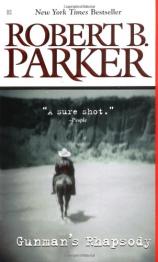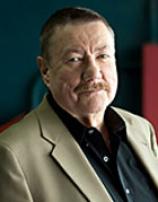Gunman's Rhapsody
Review
Gunman's Rhapsody
I grew up on TV westerns. "Cheyenne," "Sugarfoot," the short-lived
but wonderful "The Dakotas," and..."Wyatt Earp." I can still
remember the words to the theme song..."Wyatt Earp, Wyatt Earp,
brave, courageous and bold/long live his name, long live his
legend, and long may his story be told...umm umm." It was a
half-hour, and Wyatt was played by Hugh O'Brian, who never drank,
never swore, and was always polite to the womenfolk. This, of
course, was well-before Hollywood did a 360 degree turn and
developed a fascination with the anti-hero. Yep, if the show was
done now, we'd probably be treated to the sight of the bare O'Brian
buttocks before the third week was up, and Wyatt would be
cowpunching everything in a petticoat walking within a 13 mile
radius of Tombstone, Arizona.
The truth of Wyatt Earp, as with most things, is undoubtedly
somewhere in between. We'll probably never know exactly where, the
late 19th Century not having the benefit of a Michael Moore to
waddle around with a videocam and tell us all what's what. But
GUNMAN'S RHAPSODY by Robert B. Parker probably comes close enough
for ragtime.
Parker, of course, is better known for walking on the mystery genre
side of the literary street, in a neighborhood he almost
single-handedly gentrified. It's accordingly somewhat of a gutsy
move for him and Putnam to publish this bad boy in a genre that
suffers from undeserved neglect. A lot of the big boxes stick
western novels in a section called "Westerns and War" over by their
incredibly spotless restrooms. No matter; GUNMAN'S RHAPSODY is a
good enough book to endure.
Parker's Earp doesn't come off as a carbon copy of Spenser or Jesse
Stone, though there are some similarities to the former. Earp is no
boy scout, but he remains true to himself. He lives in an era where
he does not need to seek out violence; it comes to him of its own
accord, and when confronted with it, he meets it head-on. Violence
in GUNMAN'S RHAPSODY comes as part of Earp's position as assistant
city marshal in Dodge City at a time when such a position had less
to do with law enforcement and more to do with money. Politics and
its bedfellow, economics, soon bring Earp and his brothers to
loggerheads with Johnny Behan, the main power within the city.
There is (as there usually is) a woman involved at the heart of the
matter, one Josie Marcus, engaged to Behan, loved by Earp. When
Marcus leaves Behan for Earp, things appear calm on the surface
while sharks swim beneath in anticipation of the blood that is sure
to spill, as alliances form, shift and reform. Parker, as always,
brings to the table his considerable array of narrative gifts,
including his canny ear for dialogue. He wisely does not endow Earp
with Spenser's glib tongue, choosing, instead, to cast Earp as
strong, quick and silent. Talk is a distraction for Earp in an era
where distractions often meant the difference between life and
death.
Parker, with GUNMAN'S RHAPSODY, actually pulls off the incredible
accomplishment of writing a novel in a genre other than the one for
which he is known, with a protagonist he is not normally associated
with, and leaving the reader quite satisfied with the result
instead of yearning for the familiar settings and characters.
GUNMAN'S RHAPSODY is much more than a diversion, more than a
traipse into uncharted Parker territory. It is, ultimately, a novel
that stands quite well on it's own on the shelf of Parker's already
awesome bibliography.
Reviewed by Joe Hartlaub on January 22, 2011





